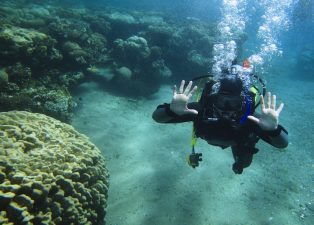 These are the two sharks killed by Egyptian authorities following several attacks off the Sinai peninsula last week. One of the sharks responsible for some attacks remains at large.
These are the two sharks killed by Egyptian authorities following several attacks off the Sinai peninsula last week. One of the sharks responsible for some attacks remains at large.
There are many consequences of climate change that scientists foresaw: melting glaciers, rising temperatures, freak storms, flooding, drought, and continued loss of biodiversity. Then there are the consequences that weren’t necessarily anticipated: a change in species behavior.
Despite popular perception, sharks are not man-eating killers. But they do need to eat. While the Sharm al-Sheikh investigation is ongoing, one American experts claimed that the attacks were not carried out by one rogue killer, but occurred as a result of more than one shark’s rational desire to find food.
Overfishing, dumped animal carcasses, human intervention – all may be contributing factors. As the oceans are over-fished and prey increasingly difficult to obtain, sharks may be seeking alternatives. We would do the same. Any species would. It’s called adaptation.
After closing and then re-opening the Sharm al-Sheikh beaches following attacks on four tourists – in order to avoid disrupting the impact on the economy – a seventy year old German woman was killed.
Snorkelers and inexperienced divers were then prohibited from entering the waters, and three of the world’s leading experts were invited to travel to Sinai to investigate the attacks.
Dr Marie Levine, head of the Shark Research Institute in Princeton, USA, Dr George H Burgess, the director of the Florida Program and curator of the International Shark Attack File at the Florida Museum of Natural History for Shark Research, and Dr Ralph Collier, of the Shark Research Committee and author of Shark Attacks of the Twentieth Century will hopefully help local authorities understand this strange shift in behavioral patterns.
“The attacks were “undoubtedly” caused by environmental factors, as two separate shark species had been identified from photographic evidence,” Dr. Burgess told the BBC. He added that it makes no sense to conduct a shark hunt.
“What you have here are rational attempts by a predator to find food,” he added.
While researchers conduct their investigation, divers, snorkelers, and swimmers are advised to stay in groups within the reef, and to avoid the water after dark.
:: BBC
More on the Red Sea Shark Attacks:
Three Russian Red Sea Snorkelers Attacked By White-Tip Shark
Oceanic White Tip Shark Kills Elderly Woman In Egypt
Egyptian Park Authorities Killed Wrong Sharks After Red Sea Attacks



